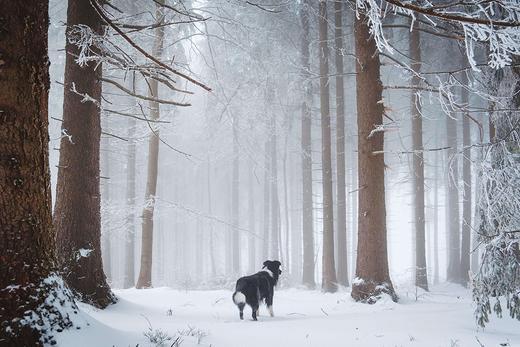Estimated Read Time: 6 minutes
Summary: In this blog we learn all about winter and dogs. We’ll find out how to keep dogs warm in winter, whether they need flea and tick medicine in winter and we’ll learn about walking dogs in winter too…
Some pups may love to bound around in the snow, whilst others may cower from the chill and prefer to snuggle up on the sofa with you, their pet parent. However, regardless of their enthusiasm levels, time outside is essential for their overall health – they still need exercise and may generally need to venture into the cold. So, how can you support and protect them during the colder months?
How To Care For Dogs In Winter
How To Protect Dog Paws In Winter
If it snows where you live, and you take Fido out for a stroll, your dog can be susceptible to ice and snow building up in-between their paw pads and/or experience chapped, cracking paws from the cold.
You can look tin o purchasing dog boots for winter which can help enormously if your dog is particularly partial to a romp in the show or if they’re a senior dog that experiences joint stiffness to help give them more traction with the ground. If your dog is reluctant to wear a pair of dog boots for winter, then look at investing in dog paw balm which can be applied as a protective coat pre-out door play and then soothe them afterwards!
It is also worth being mindful of the deicing products that are used by the authorities on paths and roads during icy weather; these can be rough on a dog’s skin and paws. Many of these deicing products administered to the ground to help stop people slipping over and cars spinning off the road can be toxic for dogs to ingest. So, make sure you either use dog boots for winter or thoroughly wipe down their legs, belly and paws when you return home before they have a go at cleaning themselves. If you use deicers on your driveway or paths at home, make sure you purchase one that boasts “pet friendly” on the packaging.

How To Keep Dogs Warm In Winter
All dogs can feel the cold in winter, but smaller dog breeds are typically more sensitive to the chill. This is because they have less body mass, are closer to the ground and therefore more likely to make direct contact with the snow and cold earth. In addition, senior dogs, those with health conditions and puppies are also more likely to feel the cold.
That said, even thicker furred breeds can get chilly quickly. You should always monitor your pet during periods of extreme weather temperature: low or high.
Watch your dog closely when walking them outside in winter and if you have a dog that may be more vulnerable in lower temperatures, it may be better to take them on two shorter walks than one long one on particularly cold days. Alternatively, on days where it feels far too cold to go out, make sure you’re engaging in active indoor activities with them instead to keep their exercise levels up like a game of Fetch or Tug-Of-War. Don’t leave your dog outside for too long, especially when the weather is also wet whilst cold – this can be dangerous for your dog.
You can also look at buying a dog winter jacket for your pup as these can help them conserve body heat. Many reputable pet brands make a good dog winter jacket now so shop around for the right one for your pooch.
Do Dogs Need Tick Prevention In Winter?
Fleas, ticks and worms are a threat to dogs all year around. You should be administering regular parasitic preventative treatment to your pets regardless of the weather outside to help protect them, your home and the community of pets around you.

Do Dogs Eat More In Winter?
If your dog is more reluctant to be active in winter, they may need less food. But, if your dog is very keen to run and romp in the snow or is a working outdoor dog, then they may need more food to keep up with the calories they’re burning whilst out and on duty.
Do Dogs Sleep More In Winter?
Not usually as dogs aren’t animals who hibernate, but it’s not impossible. You may notice that your dog’s energy levels drop and this can be in line with the lessening in daylight length. If they’re not being walked because of the weather this may cause them to be low in mood and/or lethargic, so make sure you’re engaging in extra indoor play time with them to help counter this.
Winter & Dogs
Make sure you’re keeping yourself safe too whilst out on a wintery dog walk. If you slip or stumble on icy ground and fall on a walk far away from home this can be detrimental to both you and your pet. Stay closer to home on solo dog walks when it’s cold or be sure of your mobile phone’s reception and battery in a desired walking location before you venture out with your pet.
If you live in an area that can experience extreme weather storms during winter and can keep you bound to home, make sure you’re well stocked on supplies at all times, including items your dog may need.
Sources
Author Park, Grace ”Winter Safety For Your Dog” Nov 27. 2019, Wag Walking https://wagwalking.com/daily/winter-safety-for-your-dog
Author Naish, Dom ”Why Do Dogs Sleep More In Winter Time?” Oct 05. 2017, Top Dog Tips https://topdogtips.com/do-dogs-sleep-more-in-winter/





